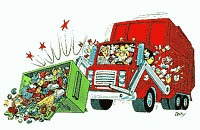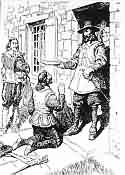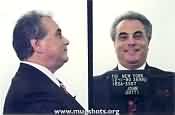 |
2 Government |
From Segment 1, we now have a vitally important stake in the ground; a starting point, for much of what follows in TOLFA: each of us is our own self-owner, self-governor. Now let's pose a very simple question: that being so, what way of arranging relationships with each other would be consistent with that key attribute of being human? As usual, when you've entered your own reply, go ahead and check the other one.
Good, so that wasn't hard! Yet in that one question we have identified the fatal flaw in almost every actual human society that has ever existed.
A society in which all actions are voluntary (that is, in which any and all obligations are undertaken freely without coercion) is called a "market", or a "market arena" or for emphasis a "free market." We'll be exploring some of the delights of that in the next Segment, #3.
Here in Segment 2, we'll look at the alternative way of structuring a society, in which all or some actions are taken involuntarily, under compulsion, in obedience to laws or to obligations that were thrust upon one or more person, rather than being accepted willingly. This kind of society we call a "political arena" or a "state" or one ruled by a "government."
Further and most unusually, we'll start by enquiring exactly what government is, in its essential nature - just as, in Segment 1, we started by discovering what human beings are, in our essential nature. Let's see what you presently think it is. Remember to check the other answers.
Later TOLFA segments will address the reasonable questions of how a Market might provide functions like defense and education and justice, which have traditionally been regarded as government responsibilities. For now, please accept that they can and should be so provided - and very much better. We are left, therefore, with the simple definition of what government is: the absence of a market.
1. Garbage In
In most of TOLFA's segments we'll learn how very badly government performs its many tasks, and what appalling suffering, misery and death results. That's the "garbage out" and some of it will be familiar; you can verify bits of it right now by opening today's newspaper. You'll find that most of the stories report bad news, and that most of those concern government or the political arena - while most of the better-news stories relate to the market arena, to real individuals.
 Many people are hurt and surprised by this "garbage out" - they expected something good and noble. Each
time a President is elected, fine speeches are made and hopes for a brighter tomorrow run high. "The torch
has been passed to a new generation," said JFK to wild cheering by supporters. Within three years he
was dead, and within five years the government he had led was mired in a catastrophic, needless and
unwinnable war that killed 55,000 Americans and twenty times as many Vietnamese. Within seven years
the dollar was finally disconnected from gold, leaving the people's money at the mercy of the Feds' inclination
to print as much as they saw fit, and so within nine years inflation was running rampant worldwide. Many see a parallel with the disaster in Iraq - yet Bush, too, was popular when elected. Twice!
Many people are hurt and surprised by this "garbage out" - they expected something good and noble. Each
time a President is elected, fine speeches are made and hopes for a brighter tomorrow run high. "The torch
has been passed to a new generation," said JFK to wild cheering by supporters. Within three years he
was dead, and within five years the government he had led was mired in a catastrophic, needless and
unwinnable war that killed 55,000 Americans and twenty times as many Vietnamese. Within seven years
the dollar was finally disconnected from gold, leaving the people's money at the mercy of the Feds' inclination
to print as much as they saw fit, and so within nine years inflation was running rampant worldwide. Many see a parallel with the disaster in Iraq - yet Bush, too, was popular when elected. Twice!
We note, however, that by definition government is fatally flawed from the get-go - because it ignores or over-rides the fundamental attribute of human beings, namely that we each own ourselves and so have the right to make 100% of our own choices. Therefore, government is fundamentally irrational and that's the garbage that goes in. So we are not at all surprised when garbage later comes out - even though government may hire talented people who mean well.
There's a further reason why the institution of government consists of "garbage in", and is mythical from the get-go: that is, the flawed theories of where it gets its power. Historically there have been two ideas "sold" to those it rules: (a) God and (b) the People. The former was seen in the supposed "Divine Right of Kings" and it rested of course upon the amazing assertion that because King X had clawed his way to the throne, God must have selected him for the job. The latter is the theory underlying democratic governments: that the People delegated certain powers, as in the US Constitution. Unfortunately this is riddled with falsehood, for most of the powers so "delegated" were not possessed by any of "the people" in the first place (for example, the power to seize property against the owner's will, or to draft him into a war) - and nobody can delegate a power he does not have. Hence, again: garbage in.
2. Purpose: Myth and Reality
 You've almost certainly never met anyone who said to government or to some group or person wishing
to be elected to government "Rule me, please!"
You've almost certainly never met anyone who said to government or to some group or person wishing
to be elected to government "Rule me, please!"
What does happen at elections (assuming government permits elections) is that a large part of society says to it in effect "Rule him on my behalf, please!" That is, voters hope to gain a benefit at the expense of their neighbors; an election is "an advance auction of stolen goods" as H L Mencken so perceptively put it. Some are prudes who want government to ban lifestyles they disapprove; some are homebuyers who seek a tax advantage over renters, some are parents who want their children "educated" without paying fees, some are business owners who seek to hobble their competitors with regulations which they themselves can readily afford to obey but a small, new market-entrant can not. And so on, endlessly and sickeningly.
Such is part of the reality in the Political Arena; factors like those make government popular among the 50% or so who (in late-20th Century America) being allowed to vote, do so. This is how a ruled population is fooled into giving government implicit sanction; note that no election has ever offered voters the real choice of "do you wish to have a government, or not?" and so at no time has any society ever been invited to give its explicit sanction. More on that under (3) below.
Blatantly to advertise to voters that government exists to steal from neighbors on their behalf would not be good P.R., so instead an elaborate myth is constructed to whitewash the theft and coercion.
That myth usually includes hushed appeals to Patriotism, and at any political meeting national
flags adorn the platform to convey the idea that a vote for that candidate would be a
vote for "our country." Travellers can note that this happens in every country!

Hands are sometimes placed solemnly over hearts, as if all unite in worship of Our Nation. In such ways is Mencken's accurate picture of a sordid "advance auction of stolen goods" sprinkled with perfume - or even holy water, if a parson is invited along to offer prayers. No matter that none in the audience - nor on the platform, probably - could define precisely and unambiguously what "Our Nation" means. Such use of that "Our" and "We", the first person plural, is integral to the government swindle - it assumes everywhere a completely fictitious collective interest. There is none; there are millions of individual interests, but no collective ones whatever.
The myth goes much deeper of course, and is propagated by every available method, not just at election time. It holds that in some mysterious way government is "necessary" for the public wellbeing; a great tragedy of the American Revolution is that its intellectual founder Thomas Paine rightly saw that government was "evil, even at its best" but could not think far enough outside the box to grasp that something evil could never possibly be "necessary." The process of indoctrination begins no later than entry to government schools, and happens worldwide, and its effect is so very deep that in a large part of modern and supposedly rational society it is still seen as dishonorable to "dodge taxes" or "refuse to fight for one's country" when called on to do so.
 The government lie that is perhaps the most seductive, yet certainly the most blatant, is that
it exists to "protect" the "people it serves." Yuck! First of course there was never yet a
government that served anyone; it rules, period - the very opposite. And secondly it is clearly
impossible for any gang of rulers to protect a society against a foreign threat without calling
upon members of that society to do the actual fighting! - and this politely overlooks the ugly
fact that every American war since 1781 (or certainly since 1814) was not defensive, but
offensive. The political thugs who provoke the war and sit behind desks directing it
are not protecting anyone; only the grunts in uniform do that, and as often as not they are
forced into the activity by being threatened with imprisonment or execution if they refuse.
The government lie that is perhaps the most seductive, yet certainly the most blatant, is that
it exists to "protect" the "people it serves." Yuck! First of course there was never yet a
government that served anyone; it rules, period - the very opposite. And secondly it is clearly
impossible for any gang of rulers to protect a society against a foreign threat without calling
upon members of that society to do the actual fighting! - and this politely overlooks the ugly
fact that every American war since 1781 (or certainly since 1814) was not defensive, but
offensive. The political thugs who provoke the war and sit behind desks directing it
are not protecting anyone; only the grunts in uniform do that, and as often as not they are
forced into the activity by being threatened with imprisonment or execution if they refuse.
So much for the myth, and for part of the reality; the other, more potent part of the reality about what government is for is power. However voters may perceive usefulness in the institution, for the rulers themselves the purpose of government is power and control. All leaders in the Political Arena are hopelessly drunk with power - the sheer enjoyment of directing how other people shall live. Example:
- Government monopolizes certain functions within its domain; like money, "justice", "education", postal delivery, and either subsidizing or making war on foreign governments as the fancy takes them. If you want such services, you have but one place to go; and the thugs providing it enjoy the sight of you coming to beg.
- Even worse: whether you want those services or not, government says you will pay for them anyway! Childless couple must pay school taxes, pacifists pay war tax, non-drivers pay for government roads. No businessman can compel non-customers to pay for goods and services they don't wish to buy; government thugs can. Such power intoxicates indeed.
- What it does not own or monopolize directly, government regulates so providing its bureau-rat minions with rush after rush of pleasure as they say to one productive person after another "Do this, and he doeth it." Regulations permeate business so fully that nobody can possibly read them all in a single lifetime. The FDA's regulation of medicinal drugs is one common and terribly damaging example. Such power brings higher highs than any drug they make illegal.
So long as you charge $8 or more - no problem. But if you want to increase your customer base by lowering your price, the State will pressure you to obey and if you resist, ultimately you will be shot. Ultimately, government is no more than a bunch of thugs with guns.
3. The Mafia Parallel
TOLFA Segment 3 defines and describes the Market, but it should be clear even now that the market is everything that government can never be:- governed by voluntary contracts between individuals
- characterized by voluntary exchanges to mutual benefit
- closely and rationally conformant to human nature
| It's interesting to compare government to the one other kind of nonmarket institution with which we might be familiar: an organized criminal gang - the Mafia. Some people (notably those who work for it) take offense when government is compared to the Mafia; in fact, as we'll see, if anyone is entitled to take offense it's the Mafiosi. They're less hypocritical. |  |
||||||||||||||||||
| |||||||||||||||||||
Thus, both gangs engage in compulsory activity, so both are nonmarket institutions - but
the Mafia has one redeeming feature: it also participates in market action (voluntary exchanges) while government has no redeeming feature, for it never does.
4. Segment Review
We've covered a lot of ground here, introducing an accurate perception of what government is about
that is totally unfamiliar to most people. So before moving on to Segment 3, please test yourself with
the Questions below, to make sure the key facts are well absorbed. As usual, discuss anything with
your Mentor that needs clarification, and be sure to visit the wrong answers as well as the right ones - and
do spend time in "Further Reading", especially the articles with free on line access.
For further reading:
Spooner's Letter to Thomas Bayard
Government - Who Needs It?
Primary Day in the Trash
The Government Hoax
The Government Myth
We Are All Terrorists
Demon Democracy
Rule Me! Please!
"The Market for Liberty" by Morris & Linda Tannehill "The Most Dangerous Superstition" by Larken Rose
"The Adventures of Jonathan Gullible" by Ken Schoolland